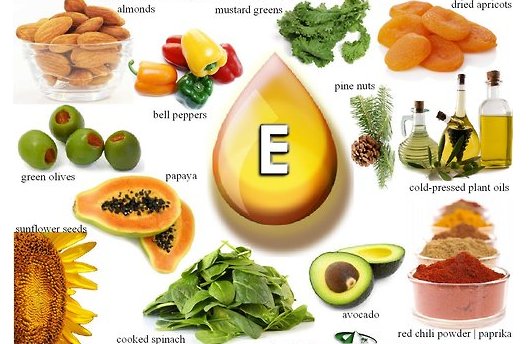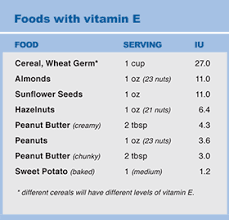Scientific/medical name(s): alpha-tocopherol, tocopherols, tocotrienols

Vitamin E is an essential fat-soluble nutrient that serves as an antioxidant
and is also used in cell signaling, regulating gene expression and immune function. ( Antioxidants block the action of free radicals, which are activated molecules that can damage cells. ) There are 8 natural forms of vitamin E . The most important one to the human body is alpha-tocopherol .

The main sources of vitamin E in the diet are vegetable oils, green leafy vegetables, nuts, cereals, meats, egg yolks, wheat germ, and whole-wheat products .

Vitamin E deficiency is extremely rare. It happens almost exclusively in people with an inherited or acquired condition that impairs their ability to absorb this vitamin, such as cystic fibrosis, short-bowel syndrome, or blocked bile flow. Deficiency can also happen with severe protein-calorie malnutrition (starvation). Symptoms of vitamin E deficiency include muscle weakness, vision problems, immune system changes, numbness, trouble walking, tremor, and a poor sense of balance. Over a long time, vitamin E deficiency may progress to blindness, heart disease, permanent nerve damage, and impaired thinking.
Chemistry of Vitamin E
Tocopherols (Vitamin E) are equipped to perform a unique function. They can interrupt free radical chain reactions by capturing the free radical; this imparts to them their antioxidant properties. The free hydroxyl group on the aromatic ring is responsible for the antioxidant properties. The hydrogen from this group is donated to the free radical, resulting in a relatively stable free radical form of the vitamin.

Overview
| Early observational studies suggested a protective effect of vitamin E against prostate, bladder, and colorectal cancer. |
- Some proponents claim vitamin E plays a role in protecting the body against cancer by bolstering the immune system. It’s also an antioxidant, which helps prevent damage to DNA and other important parts of cells. Some also believe the vitamin can help some chemotherapy drugs work better and may reduce some side effects of chemotherapy and radiation therapy. But others believe high doses of vitamin E during treatment might interfere with the effectiveness of radiation therapy and chemotherapy by preventing cancer cells from being destroyed.
- Proponents also claim that vitamin E supplements protect against heart attacks by preventing a build-up of harmful cholesterol and blood clots in the blood. There are also claims that vitamin E eases the inflammation associated with arthritis, speeds wound healing in people who have suffered burns or have had surgery, and slows the progress of Parkinson’s disease and Alzheimer’s disease.
- Some say that it may help prevent or treat eye problems like cataracts and age-related macular degeneration. Vitamin E is also promoted to protect against the effects of pollution and overexposure to the sun.
Balanced Diet
A balanced diet normally gives the body the amount vitamin E it needs, especially a diet high in green leafy vegetables and fiber from grains and cereals. The recommended daily allowance of vitamin E for adults is 15 milligrams per day from food, with 19 milligrams per day recommended for women who are breast-feeding.
h2. What is the history behind these link?
Since the 1940s, researchers and others have thought that vitamin E might prevent heart disease. Researchers have observed that people who have cancer often also have low levels of vitamin E in their blood. More recently, several clinical trials have been completed (and others are still in progress) comparing the risk of cancer among volunteers randomly assigned to get either vitamin E supplements or a placebo (look alike sham pills).
What is the evidence?
The early evidence for the preventive effects of antioxidants like vitamin E came from animal studies and from observational epidemiologic studies that use surveys to estimate how much vitamin E a person gets from food and supplements. The most reliable studies on this issue are controlled clinical trials, such as a large 1994 study of antioxidant vitamins and cancer conducted by the National Cancer Institute (NCI) and the National Public Health Institute of Finland. The study was designed to find out whether antioxidant vitamins in high doses (50 milligrams daily) could reduce the incidence of lung cancer, other types of cancer, and other illnesses among 29,000 male smokers. The study found vitamin E supplements did not reduce lung cancer risk. It found lower rates of prostate and colorectal cancer, but higher rates of bladder, stomach, and other types of cancer in those who got high doses of vitamin E.
Individual clinical trials can sometimes provide misleading results because of variation in research methods or random statistical variation. Because of this, researchers often analyze the combined data from many studies. This is called meta-analysis. A meta-analysis published in 2005 combined data from 19 clinical trials that looked at vitamin E supplements. The results showed that vitamin E supplements, overall, do not lower the risk of heart disease or cancer, and that people who got the placebo actually lived slightly longer than those getting the supplements.
Another large clinical trial published in 2005 also found no risk reduction for heart disease or cancer overall. It even suggested that heart failure was slightly more common in people taking vitamin E. And a 2007 review of 68 studies of antioxidant vitamin supplements found that people taking vitamin E supplements had a shorter life expectancy than those who did not take these supplements.
Some animal experiments and human studies suggest that vitamin E may protect against cancer. Serum alpha-tocopherol concentration was studied for its prediction of cancer in a cohort of 36,265 adults in Finland. During a mean follow-up of 8 y, cancer was diagnosed in 766 persons. The levels of serum alpha-tocopherol were determined from stored serum samples (at -20 degrees C) taken from these cancer patients and from 1419 matched control subjects. Individuals with a low level of alpha-tocopherol had about a 1.5-fold risk of cancer compared with those with a higher level. The strength of the association between serum alpha-tocopherol level and cancer risk varied for different cancer sites and was strongest for some gastrointestinal cancers and for the combined group of cancers unrelated to smoking. The association was strongest among nonsmoking men and among women with low levels of serum selenium. The findings agree with the hypothesis that dietary vitamin E in some circumstances protects against cancer.
Should be taken during cancer treatment?
Many researchers and clinicians believe that taking high doses of antioxidant vitamins may change how well radiation therapy and some chemotherapy drugs work, but they often disagree as to whether the changes are helpful or harmful. Some researchers and doctors think antioxidants like vitamin E might reduce side effects or even improve effectiveness of radiation or chemotherapy. Others are concerned that antioxidants will reduce effectiveness of these treatments. Very few studies have yet been done in humans to test these theories, and there is no clear consensus yet. Most oncologists advise their patients to avoid antioxidant vitamin and mineral supplements during treatment, but some surveys suggest this advice is often ignored by patients. Further studies are needed to resolve this important question.
Are there any possible problems or complications?
Vitamin E supplements found in foods and in multivitamins are generally considered safe. Large doses of vitamin E (more than 533 milligrams or 800 IU) taken over a long time can cause nausea, vomiting, stomach pain, and diarrhea. It may also cause heart problems and change the blood’s ability to form clots, which might cause bleeding or even stroke in a few people. Megadoses of vitamin E supplements are not advised for people who are taking blood-thinning medicines, like warfarin , because the supplements might increase the effects of the drugs. More research is needed on the effects of large doses of vitamin E.
People with cancer should talk to their doctors before taking vitamin E or any other vitamin supplements, especially while they are getting chemotherapy or radiation therapy. Relying on this type of treatment alone and avoiding or delaying conventional medical care for cancer may have serious health consequences.